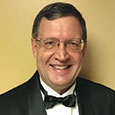
Early in my career at our spring concert, my junior high band ably performed its closing number, a rousing classic rock ‘n roll medley that the audience really enjoyed. Up next, the senior high director introduced his band in part by saying, “And now we’re going to play some real music.” Backtracking a little, he then added, “I mean music that people my age enjoy.” (Ironically, the music my band performed was current when he was a kid.)
As for why he said it, I believe there was a little resentment at how well my band had been doing throughout the year, and he suspected the selections he was about to play were not going to be as entertaining or well-received as the junior band’s. Even so, he probably didn’t mean it as bad as it sounded. My students asked me the next day why he put us down like that, and I downplayed it. I did want them to be in his band the next year even though he hurt his chances of that happening. I tell this story to make the point that public speaking at concerts is very important and if you are not gifted at speaking off the cuff – and few of us are – don’t do it. Preparation is key.
I have to admit that when it comes to concerts, what I am going to say to the audience is sometimes put on the back burner because of other pressing matters related to concert preparation; sometimes just getting the music ready is difficult enough. Despite this, it is important to make every effort to organize your remarks before concerts. Poorly stated comments, constant hemming and hawing, and rambling preambles before every selection can annoy an audience and detract from the overall effect of the program. Also avoid the temptation to make excuses, such as how little rehearsal time the band had or how difficult the selection is. It merely tips off the audience that something might go wrong and puts a negative image in their minds before you even start.
John Philip Sousa didn’t say anything at all at his concerts. A sign with the title was posted and off the band went. I do not think one needs to go that far; speaking between numbers, when done efficiently, can build a rapport with the audience and give the percussion time to make adjustments. If you decide that selections need verbal descriptions before each one is performed, have a student prepare and then read a description of the piece before its performance. Another option is the traditional method of putting the information about each piece in a program and making spare remarks before each selection. Unfortunately, some directors have written notes in the program and still blather on.
As for other aspects of the concert, it is important to write down as many comments as you can so you are not relying too much on memory. It is amazing the things directors can bungle when under a little pressure. In recognizing students on stage, I’ve blanked on names of students that I have known for years. If you are recognizing seniors on stage at the final concert, have the students complete an information sheet beforehand that includes name, parent name, accomplishments (band, academic, and other), their favorite memory of band, and their future plans. To make the presentation even more special, cite some special quality of the student or maybe a humorous memory.
If you have a guest conductor at your concert or are introducing one at a clinic, a succinct but effective introduction is in order, particularly if more information is in the program. Make sure to pronounce the conductor’s name correctly and adjust the biographical data so that it doesn’t sound like a rehash of the biographical information in the program; develop something more natural that will create a bond between the speaker and the audience. Again, whatever you do, avoid relying on memory and ad-libbing.
It is commonly asserted that a fear of public speaking is the number one fear in America, with a fear of death coming in second. Follow the tips in this column so your audience doesn’t fear your public speaking more than death.





